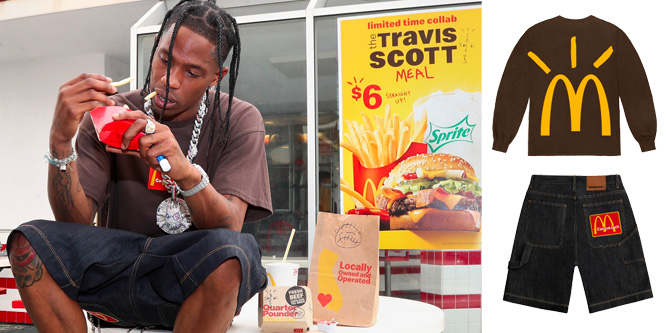
During my childhood years, my family’s kitchen cabinets used to be lousy with the sorts of commemorative glassware you’d get at Burger King or McDonald’s — a Luke Skywalker here, a Snoopy there. These were part of huge global marketing pushes for creative projects being milked for every last ounce of intellectual property, but also savvy positioning by the restaurants. Fast-food companies have long attempted to stave off disposability by piggybacking on broader cultural moments, hoping to extend their reach beyond the comestible into the permanently tangible.
In 2020, a fast-food chain looking for equivalent big-tent cultural relevance has few more compelling places to turn than hip-hop, the cultural arena with the most natural and ambitious gift for merchandising. And in hip-hop, there are fewer more ambitious personal branders than Travis Scott, who has his own festival, several Nike collaborations, a cereal, a Hot Wheels and much more to his name.
That said, the collaboration between McDonald’s and Scott, which began this week and includes a range of merchandise and a limited-edition meal, initially seems preposterous — what does McDonald’s know about the right singing-to-rapping ratio? What does Scott know about the right salt-to-fry ratio?

Juggernauts gonna juggernaut, though. And each gets something from the other. For Scott, it’s the scale of the flex — a partnership with a brand the magnitude of McDonald’s is essentially unheard-of. (What’s next: Walmart? Berkshire Hathaway?) It’s a way to slip his aesthetics into the global mainstream through ads and products, and also something that doesn’t exist in music anymore: physical distribution locations. (There are over 13,000 McDonald’s restaurants in the United States.)
In exchange, McDonald’s gets some refracted cool and the satisfaction of knowing that thousands of young people might find their way — through the co-branded merchandise — into becoming walking billboards, especially crucial given that while McDonald’s remains among the most valuable fast-food restaurant brands on the planet, with total global revenue of around $21 billion each of the last two years, it’s still a business in overall decline, from a high of $28 billion in 2013. Partnering with Scott is a way to advertise to young people without all the burdens and potential misfires of actually advertising to young people.
![]()
It would all be so sinister, so savagely instrumental, if it weren’t so effective. The range of products in the merchandise drop is frankly staggering. There are umpteen T-shirts — some insert Scott’s imprint name, Cactus Jack, into the Golden Arches; some are inspired by early 1990s sports aesthetics. There are rugs, a lunchbox, socks, a tie, a $90 McNugget body pillow. As with most of Scott’s merch, it’s well-designed, colorful, playful. The brown work jacket with “Billions and Billions Served” embroidered on the back ($128) could have been right out of a dawn-of-the-’90s Beastie Boys video.
These garments are likely to look better in the rearview a couple of decades from now. Though they’re well-designed, wearing clothing advertising the leading fast-food brand is, in a Sweetgreen era, an unprogressive choice — nostalgia tends to soften capitalist excesses, though.